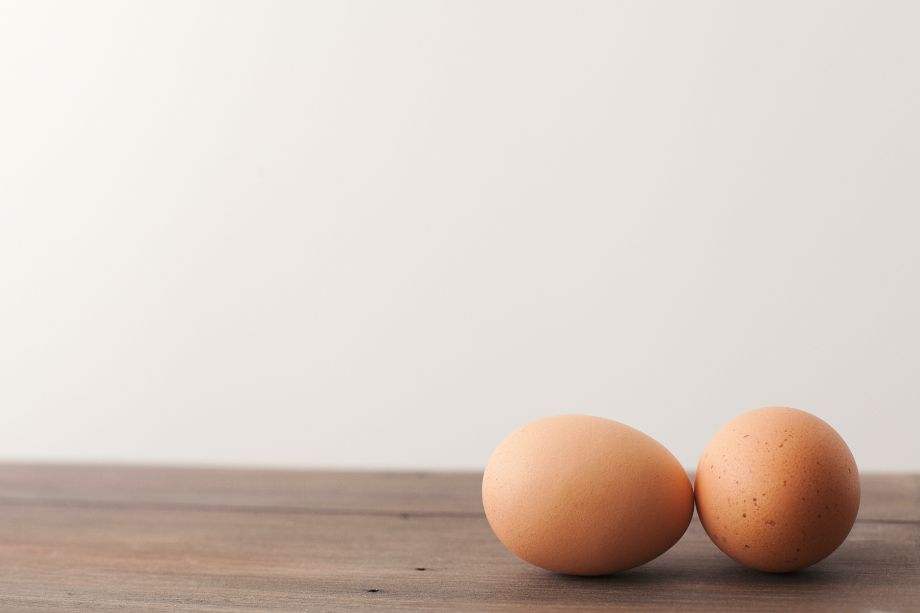We test and review fitness products based on an independent, multi-point methodology. If you use our links to purchase something, we may earn a commission. Read our disclosures.
Check out any high-protein food list and you’re sure to find eggs make the cut. Eggs are a versatile ingredient for healthy eating that are easy to prepare and can be enjoyed any time of day for a quick protein fix.
Whether you start your day with a scramble or add cooked eggs to salads, do you know exactly how many grams of protein in an egg? Turns out, we can’t answer that question with a one-size fits all answer.
Keep reading to learn what determines how much protein is in an egg and whether egg whites or whole eggs are more nutritious. We’re also sharing why eggs deserve a place in your diet, plus ideas for enjoying them that go beyond basic boiling.
Medical disclaimer: This article is intended for educational and informational purposes only. It is not intended as a substitute for medical advice. For health advice, contact a licensed healthcare provider.
How Many Grams of Protein in An Egg?
The amount of protein in an egg depends on the size of the egg. You’ve probably noticed your grocery store’s selection of eggs includes a variety of sizes, and a small egg will have less protein than a large egg.
Here are the most common egg sizes and the amount of protein1 in each:
- Small: 4.79 grams per egg
- Medium: 5.54 grams per egg
- Large: 6.3 grams per egg
- Extra-large: 7.06 grams per egg
- Jumbo: 7.94 grams per egg
Fun fact: eggs are classified by size2 according to the minimum required weight per dozen eggs—not the actual size of each individual egg. Most people buy large or extra-large eggs, so we can estimate you’ll typically get 6-7 grams of protein from one whole egg. There’s no difference in protein between raw eggs and cooked eggs.
Egg Whites vs. Egg Yolks
If you’re wondering whether whole eggs or egg whites are best for hitting protein goals, the answer might surprise you. An egg’s protein content is almost equally divided between the egg white and yolk.
Here’s the protein breakdown for one large egg:
As you can see, the egg white contains slightly more protein than the yolk, with 57% of the egg’s total protein content.
However, while protein content is quite similar, other nutrient levels are a bit different when separating the white from the yolk.
While egg whites have the upper hand when it comes to protein, many other beneficial nutrients in eggs are found in the yolk. Egg yolks have higher levels of dietary fat, along with nutrients like phosphorus, selenium, vitamin B12, vitamin A, vitamin D, folate, and riboflavin.
Egg yolks are also higher in cholesterol, which some may be seeking to avoid.
Do Eggs Have More Or Less Protein When Cooked?
While cooking an egg may change the texture, it doesn’t impact the protein content. It may change the form of the nutrients and partially break them down, making eggs easier to digest, but you’re not losing any protein benefits if you prefer to enjoy your eggs cooked.
A 2021 study published5 in the Journal of Agricultural and Food Chemistry examined the nutrition composition of eggs before and after cooking and didn’t observe any losses of protein (or fat) after cooking the eggs.
The best egg white protein powders use pasteurization in the manufacturing process, which cooks and dehydrates the egg whites, but they’re still packed with protein.
RELATED: How to Get More Protein
Other Nutrition From An Egg
Eggs are naturally free from carbs, making them a great choice for those following low-carb and keto diets.

In addition to protein, one large egg also contains approximately 5 grams of fat. Most of the fat in eggs is the unsaturated kind and found exclusively in the egg yolk, which means egg whites are fat-free. Pastured eggs are higher in omega-3 fats, which support brain and heart health.
Eggs are also a good source of beneficial vitamins, minerals, and nutrients including1:
- Vitamin A
- Vitamin D
- Vitamin E
- B complex vitamins, including B12 and folate
- Iron
- Selenium
- Choline
- Lutein and zeaxanthin
The macro and micronutrient composition of eggs offers several health benefits.
RELATED: Best Vitamin D Supplements
Benefits of Eggs
Including eggs as part of a nutrient-dense diet can support body composition, vision, nervous system function, and heart health.
Body Composition
Managing hunger and calorie intake are keys to successful weight loss. Eggs contain protein and fat, with not many calories, which can help you feel full after eating, curb appetite, and help you achieve a goal body weight. Studies6 have shown starting your day with eggs can suppress hunger, lead to reduced calorie intake at the next meal, and support healthy blood sugar levels.
Eggs are a high-quality, complete protein because they contain all nine essential amino acids. One of the benefits of protein is supporting lean body mass. If your goal is muscle gain, eating plenty of protein is essential. Protein-rich foods, like eggs, help muscles repair and grow following exercise. Adequate protein is also important to preserve muscle mass as we age.
Vision
Lutein and zeaxanthin7 are carotenoids and antioxidants that support normal vision and protect eyes from oxidative damage and age-related conditions, such as cataracts and macular degeneration, that can impair vision. These nutrients can not be made by our bodies, so we have to get them from food.
Nervous System
Eggs are an excellent source of choline8, which plays an important role in cognitive and nervous system functioning. There’s evidence that including rich sources of choline in your diet can help protect the brain from age-related cognitive decline and memory loss. Choline is necessary for normal brain and nervous system development, making it a critical nutrient during pregnancy and lactation.
Heart Health
Contrary to past thinking, eggs can be part of a heart-healthy diet. Numerous studies9 have shown that regularly eating eggs isn’t associated with increasing your risk for heart disease.
Egg yolks are high in cholesterol, which is why some people disagree on whether eggs are good for your heart or not. Research has confirmed that cholesterol from food has little effect on blood cholesterol levels. Instead, high intakes of saturated fat and trans fat are the driving force behind high cholesterol levels. That means eggs can still be a nutritious choice for those with elevated cholesterol.
Eggs contain mostly unsaturated fat, which is the good kind that supports normal cholesterol and triglyceride levels. A 2017 study10 found young adults who ate two to three eggs a day had higher levels of HDL cholesterol (aka the good kind) and more antioxidants in their blood.
Ways to Eat Eggs
Tired of hard-boiled eggs and egg white omelets? Eggs are a versatile ingredient that can be used to create nutritious, protein-packed meals. Here are some ideas:

- Bake a frittata with chicken sausage, veggies, and cheese.
- Fill tacos or burritos with scrambled eggs, cheese, salsa, and guacamole.
- Make egg salad with mashed avocado or Greek yogurt.
- Try shakshuka, or eggs poached in a savory, spicy tomato and veggie sauce.
- Stir beaten eggs into oatmeal towards the end of cooking for a high-protein breakfast.
RELATED: How Much Protein Can Your Body Absorb?
Other Good Sources of Protein
If you’re trying to increase protein intake, eggs are not your only option. In fact, many foods contain more protein per serving than one or even two eggs.
You can eat a variety of both animal and plant foods to hit your protein goals. Good sources of protein include:
- Chia seeds
- Cottage cheese
- Fish and shellfish
- Hemp seeds
- Lean meat and poultry
- Legumes, including black beans, kidney beans, chickpeas, edamame, and lentils
- Nuts and nut butters, including almond and peanut butter
- Plain Greek yogurt
- Pumpkin seeds
- Tofu
- The best whey protein powders (or plant-based protein powders)
How Many Grams of Protein In An Egg: Final Thoughts
Eggs are a good choice for protein, as well as beneficial vitamins, minerals, and nutrients. However, eggs shouldn’t be your only source of protein, and plenty of other foods contain more protein per serving than one, or even two, eggs.
The size of an egg determines how many grams of protein are in an egg. On average, a medium- to large-sized egg contains 6 to 7 grams of protein. Choose whole eggs (white plus yolk) to benefit from all the nutrients eggs have to offer. If you’re limiting calorie and fat intake, egg whites may be a better protein source than whole eggs, but you’ll miss out on the vitamins and minerals found primarily in egg yolks.
How Many Grams of Protein In An Egg: Q&A
Is two eggs a day enough protein?
According to the USDA1, two large eggs will give you roughly 12 grams of protein, which is nowhere near enough to meet the adult Recommended Dietary Allowance (RDA) for daily protein intake.
To meet your per meal and/or daily protein goals, you’ll have to eat more than two eggs and/or include other protein sources, such as lean cuts of meat, poultry, fish, nuts, legumes, and protein powder. A dietitian or nutritionist can help you answer the question how much protein do I need, and plan meals that provide enough protein for your goals.
How many eggs make 50 grams of protein?
There are 6 grams of protein in one large egg. To reach 50 grams of protein from eggs alone, you’d have to consume eight or nine eggs for a total of 48 to 54 grams of protein. That’s probably more eggs than you’d want to eat in one sitting.
For comparison, a 5-ounce salmon filet gives you roughly 35 grams of protein, 2.5-ounces of tuna (half a can) contains 13 grams, and a 4-ounce chicken breast has 25 grams.
How many grams of protein do you need in a day?
Protein is packed with benefits, and the amount needed can vary greatly depending on your current body weight, gender, fitness goals, training program, and more. Some need very little protein, while others may need as much as 1 gram per pound of body weight each day.
If you want a precise number, we’ve written an entire article that covers how much protein you should be eating each day.
These statements have not been evaluated by the Food and Drug Administration. This product is not intended to diagnose, treat, cure, or prevent any diseases.
References
- FoodData Central: Whole, raw, fresh egg. United States Department of Agriculture. Available at: https://fdc.nal.usda.gov/fdc-app.html#/food-details/171287/nutrients
- Shell Eggs from Farm to Table. United Stated Department of Agriculture. 2019. Available at: https://www.fsis.usda.gov/food-safety/safe-food-handling-and-preparation/eggs/shell-eggs-farm-table
- FoodData Central: Egg Yolk. United States Department of Agriculture. Available at: https://fdc.nal.usda.gov/fdc-app.html#/food-details/172184/nutrients
- FoodData Central: Egg white, raw. United States Department of Agriculture. Available at: https://fdc.nal.usda.gov/fdc-app.html#/food-details/172183/nutrients
- Hernández-Olivas, E., Muñoz-Pina, S., Andrés, A., & Heredia, A. (2021). Impact of Cooking Preparation on In Vitro Digestion of Eggs Simulating Some Gastrointestinal Alterations in Elders. Journal of agricultural and food chemistry, 69(15), 4402–4411. https://doi.org/10.1021/acs.jafc.0c07418
- B Keogh J, M Clifton P. Energy Intake and Satiety Responses of Eggs for Breakfast in Overweight and Obese Adults-A Crossover Study. Int J Environ Res Public Health. 2020;17(15):5583. Published 2020 Aug 3. doi:10.3390/ijerph17155583
- Mrowicka M, Mrowicki J, Kucharska E, Majsterek I. Lutein and Zeaxanthin and Their Roles in Age-Related Macular Degeneration-Neurodegenerative Disease. Nutrients. 2022;14(4):827. Published 2022 Feb 16. doi:10.3390/nu14040827
- Wallace TC, Blusztajn JK, Caudill MA, et al. Choline: The Underconsumed and Underappreciated Essential Nutrient. Nutr Today. 2018;53(6):240-253. doi:10.1097/NT.0000000000000302
- Li MY, Chen JH, Chen C, Kang YN. Association between Egg Consumption and Cholesterol Concentration: A Systematic Review and Meta-analysis of Randomized Controlled Trials. Nutrients. 2020;12(7):1995. Published 2020 Jul 4. doi:10.3390/nu12071995
- DiMarco DM, Norris GH, Millar CL, Blesso CN, Fernandez ML. Intake of up to 3 Eggs per Day Is Associated with Changes in HDL Function and Increased Plasma Antioxidants in Healthy, Young Adults
Further reading

Check out our arm workouts with weights before your next sesh, and find out how the humble dumbbell will help you improve your arm muscle strength and size now! Read more

We hand-picked the best heart-healthy meal delivery services that beat going to the grocery store and meal prepping. Read more

Do you know how to be a good spotter? Check out our guide featuring tips and techniques for becoming a skilled spotter on some of the most common lifts! Read more

Check out any high-protein food list and you’re sure to find eggs make the cut. Eggs are a versatile ingredient for healthy eating that are easy to prepare and can be enjoyed any time of day for a quick protein fix. Whether you start your day with a scramble or add cooked eggs to salads, do you know exactly how many grams of protein in an egg? Turns out, we can’t answer that question with a one-size fits all answer. » Read more about: How Many Grams of Protein In An Egg? A Dietitian Breaks Down The Answer » Read more

